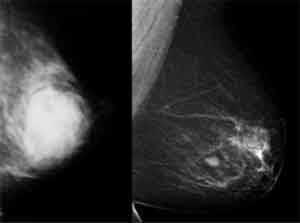- Home
- Editorial
- News
- Practice Guidelines
- Anesthesiology Guidelines
- Cancer Guidelines
- Cardiac Sciences Guidelines
- Critical Care Guidelines
- Dentistry Guidelines
- Dermatology Guidelines
- Diabetes and Endo Guidelines
- Diagnostics Guidelines
- ENT Guidelines
- Featured Practice Guidelines
- Gastroenterology Guidelines
- Geriatrics Guidelines
- Medicine Guidelines
- Nephrology Guidelines
- Neurosciences Guidelines
- Obs and Gynae Guidelines
- Ophthalmology Guidelines
- Orthopaedics Guidelines
- Paediatrics Guidelines
- Psychiatry Guidelines
- Pulmonology Guidelines
- Radiology Guidelines
- Surgery Guidelines
- Urology Guidelines
Annual mammography screening after 40 indicates greatest reduction in breast cancer-specific deaths: Study

When to initiate screening for breast cancer, how often to screen, and how long to screen are questions that continue to spark emotional debates. A new study compares the number of deaths that might be prevented as a result of three of the most widely discussed recommendations for screening mammography. Published early online in CANCER, a peer-reviewed journal of the American Cancer Society, the findings may provide valuable guidance to women and their physicians about choosing a screening regimen.
To uncover insights that might help women make informed choices about mammography screening, researchers led by Elizabeth Kagan Arleo, MD, of Weill Cornell Medicine and New York-Presbyterian, and R. Edward Hendrick, PhD, of the University of Colorado School of Medicine, used computer modeling to estimate the possible effects of three schemes: annual screening starting at age 40 years, annual screening at ages 45 to 54 years and then biennial screening at ages 55 to 79 years, and biennial screening at ages 50 to 74 years.
The investigators estimated how many breast cancer deaths might be prevented with the different screening schemes. The team found that the recommendation of annual screening starting at age 40 would result in the greatest reduction in breast cancer-specific deaths: a nearly 40 percent reduction in deaths due to breast cancer, compared with 23 percent to 31 percent reductions with other recommendations.
"Our findings are important and novel because this is the first time the three most widely discussed recommendations for screening mammography have been compared head to head," said Dr. Arleo. "Our research would be put to good use if, because of our findings, women chose to start annual screening mammography starting at age 40. Over the long term, this would be significant because fewer women would die from breast cancer."
The researchers' modeling also considered risks associated with screening, including callbacks for additional imaging and, in some cases, a needle biopsy, both of which may reveal the absence of breast cancer despite a suspicious mammography finding.
"Our results show the differences in the three current recommendations for screening mammography in terms of benefits and risks. Women and their physicians can use these findings to guide choices of when a woman begins screening mammography and how often she gets screened," said Dr. Hendrick.
An estimated 252,710 new cases of invasive breast cancer and 63,410 new cases of non-invasive breast cancer are expected to be diagnosed in women in the United States in 2017, with 40,610 US women expected to die from breast cancer in 2017. About 33 million screening mammography exams are performed each year.
In an accompanying editorial, Otis Brawley, MD, of the American Cancer Society, noted that it is ultimately an individual's value judgment as to how many false positive mammograms and biopsies are too many to save one life. He stressed that it is important to acknowledge the limitations of mammography and to make it a priority to develop a better test. "The ideal test would be easy to administer and accurate in women of all ages, meaning there would be few false positives and few tumors would be missed," he wrote.
Read the full article click on the following link : http://dx.doi.org/10.1002/cncr.30842

Disclaimer: This site is primarily intended for healthcare professionals. Any content/information on this website does not replace the advice of medical and/or health professionals and should not be construed as medical/diagnostic advice/endorsement or prescription. Use of this site is subject to our terms of use, privacy policy, advertisement policy. © 2020 Minerva Medical Treatment Pvt Ltd